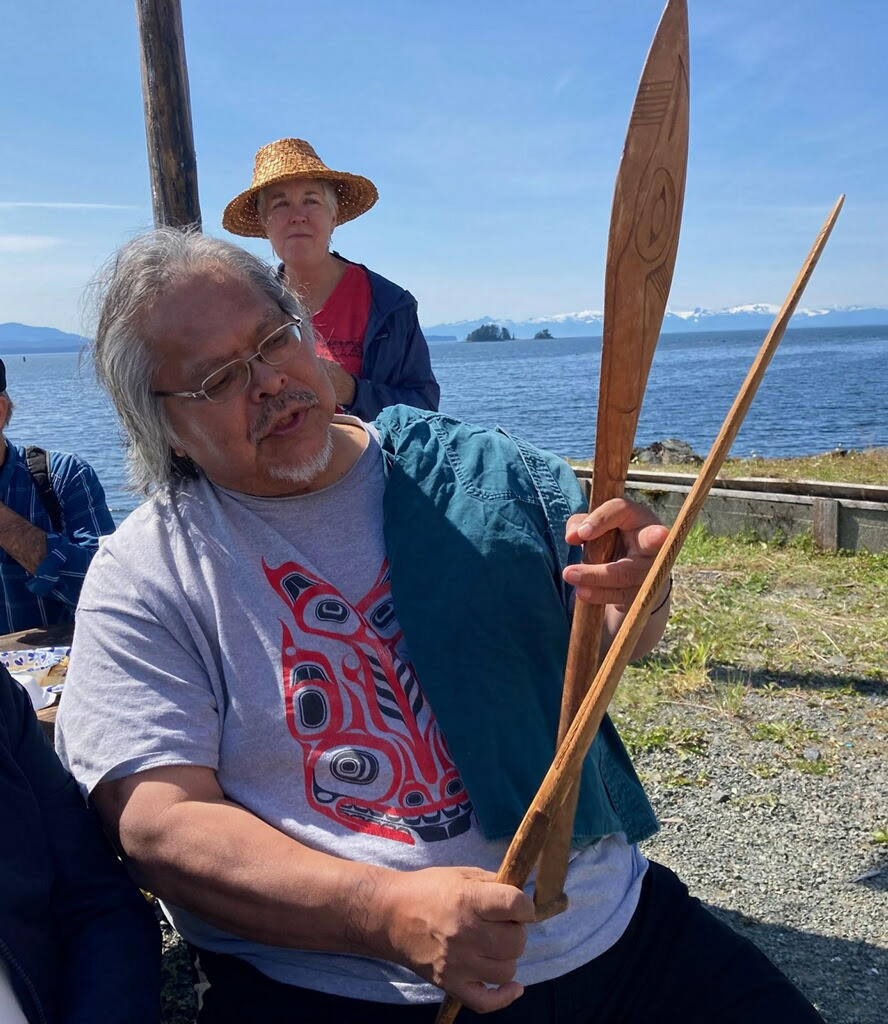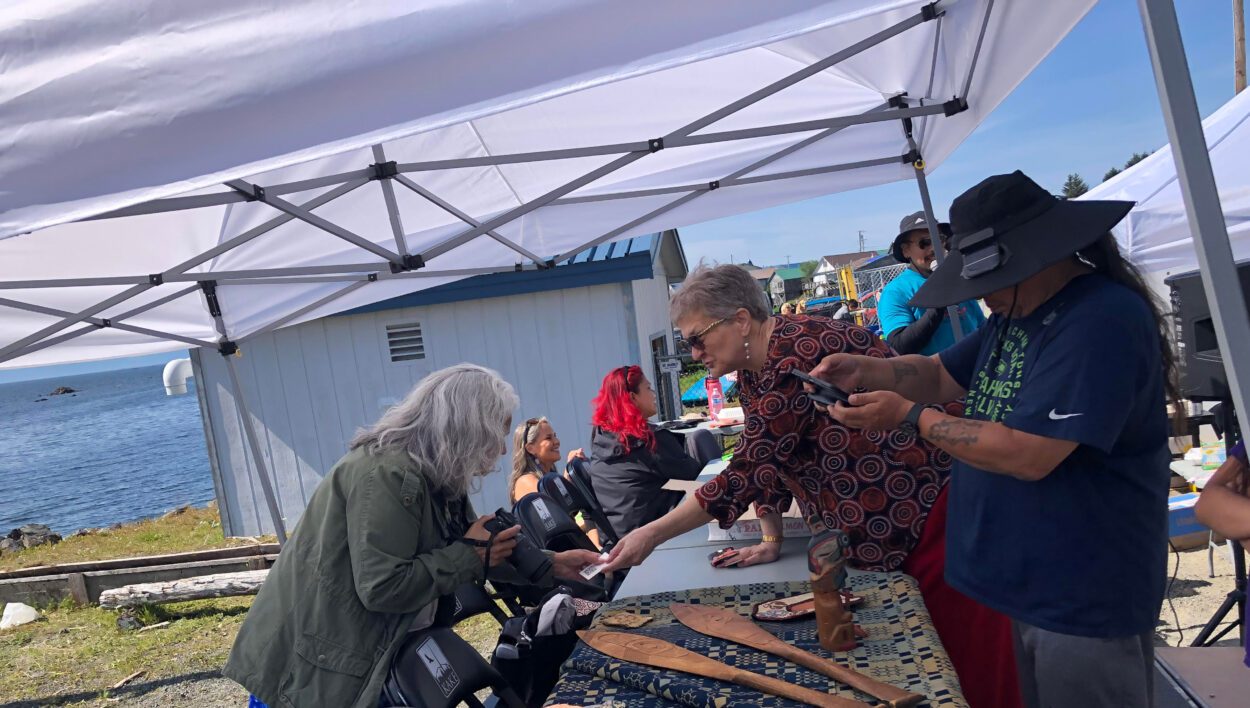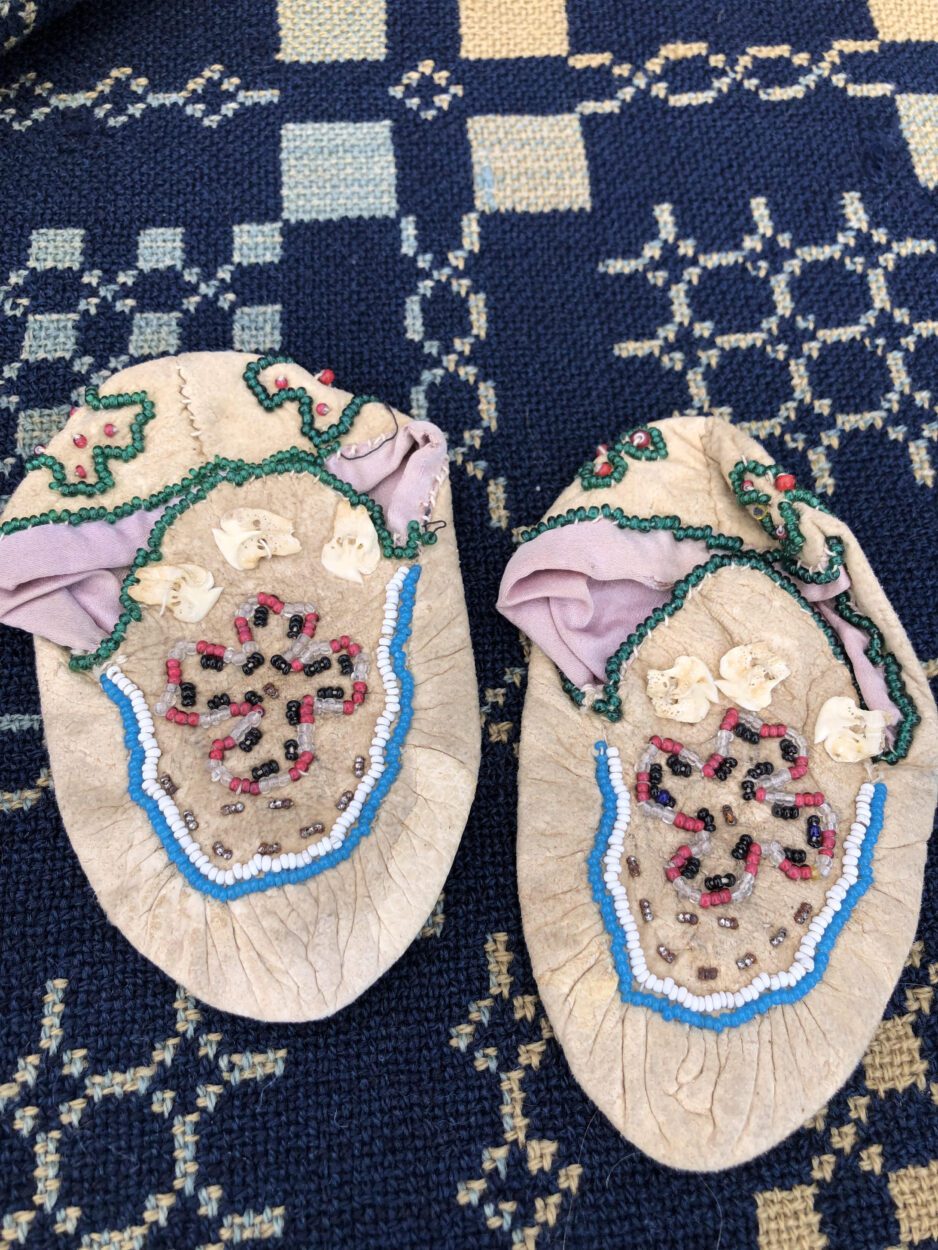
A group of quakers from Oregon visited Kake last month for the annual Dog Salmon Festival. The visit to the remote Southeast Alaska village was part of an ongoing effort to apologize for the religious group’s participation in the forced assimilation of the Tlingit people. They were there to return an assortment of cultural artifacts that had been taken out of Kake over a century ago.
Baby booties, wooden paddles, blankets, a small household totem — these are some of the cultural artifacts a group of quakers returned to Kake from Portland, Oregon this summer. But according to Juulie Downs, who was part of the group who went to Kake, some items were easier to transport than others…
“Oh, a set of canoe paddles — gorgeous, absolutely gorgeous! And really hard to get through TSA,” Downs said, laughing.
“I wanted to carry them on board, because I wanted to be careful,” said Downs. “But TSA said, ‘Oh, no, you’re going to have to go back and check them, because they could be used as a weapon. You know, you could whack somebody with them!’ [And so I said,] ‘Yeah, okay, whatever…’”
Many of them had been passed down through Downs’ family, through her great-grandmother, Bell Gardner, who taught at the quaker school in Kake around the turn of the century. It was a day school where the kids went home at night.
Downs said bringing those pieces back was just the right thing to do, as a step towards repairing the harm of the forced assimilation of Alaska Native people. But in letting go of the items that had been with her family for three generations, she also learned something about them.
“There was one thing I could never figure out,” said Downs. “I couldn’t see what it could possibly be for — it made absolutely no sense of any kind. It’s a pouch with a handle. I asked somebody, I said, ‘Do you know what this is?’ And she looked at it, and she picked it up and she handled it. She [said] it was a medicine bag. So it was important!”

Joel Jackson is the president of Kake’s tribe, the Organized Village of Kake. He said the gesture meant a great deal to the community. But, that Kake is still recovering from colonization. He said many of the community’s elders, who went to the quaker day school, don’t like to talk about their experiences there.
“I don’t know if they’re embarrassed or [if] they just feel that it’s something they want to put behind them,” said Jackson. “But the main thing I expressed about that school was the forced assimilation of our people into the Western world. And that’s what lot of people across Alaska, in the United States, you know, they feel that, you know… They were forced into going to school and following the Western ways, and they were forbidden to speak their language. “
The return of the objects was preceded by a formal apology in January. S’eiltin Jamiann Hasselquist is an Indigenous activist from Angoon. She was there to witness the apology as a descendant of a person from Kake, and said it wasn’t just a blanket apology for operating the day school.
“They talk about the horrific abuse conditions, the taking of culture, the sexual abuse,” said Hasselquist. “They speak of the things that happened in their apology, which is exactly how an apology should be when coming to make apologies to Indigenous people. It shouldn’t be vague. Because we know what happens to us. And apologies without reparations are just words that fall to the ground.”

(Photo courtesy of Cathy Walling)
Downs said it was hard for her to confront that part of her family’s history. She remembers her great grandmother as a gentle, kind person, and doubts that she participated in the worst of the abuse. But, she said it was ultimately necessary to reconcile her views of the world with what Bell Gardner, who she calls “Nana,” participated in.
“It it just struck me… Still not connecting it to Nana at that point,” said Downs, “but just realizing that we, as white people, have often not really understood other people’s religions.”
Then, one day, when she was putting on a scrimshaw pin that her great grandmother had brought down from Kake, she said it hit her “like a ton of bricks.”
“I was getting dressed, I thought, well, I’m going to wear that pin,” said Downs. “And then I went: ‘Ah!'”
Downs was getting ready for a meeting, where Hasselquist was speaking about the lasting harm missions and boarding schools had brought upon Indigenous people across North America.
“I got up and said that there was this pin that came down in my family, and [then I] gave it to this woman that had been speaking,” said Downs. “And I’m telling you, there wasn’t a dry eye in the whole room. Quakers have a kind of a concept that sometimes in a group there’s a heaviness of the Holy Spirit comes down and just enshrouds everybody, like in a cloud. It was like that.”
Cathy Walling is with another quaker group: the Alaska Friends Conference. She helped organize the reconciliation effort — including the return of the artifacts. She says she didn’t want the apology to be an empty, self-congratulatory gesture.
She said that’s why the group put up over $92,000 to cover the insurance costs for the village’s healing center, which is in the works. Walling says she hopes this act inspires other organizations with histories of colonization to take similar reparative steps.
“I’m hoping this story just helps to uplift the importance of apology,” said Walling, “for healing journeys, [and] for, you know, really — how we move forward in good ways together, towards greater healing that moves us towards transformation on our planet. Because, boy do we need it. Boy, do we need it…”
Jackson says the return of the artifacts represents a step towards healing intergenerational trauma brought about by colonization, and that the monetary contribution to his brainchild — the community’s cultural healing center — made the gesture even more meaningful.
“We’ve been talking about this intergenerational trauma for… how long now?” said Jackson. “And I think it’s time that we start healing our people. I’ve had the cultural healing center in mind for… I don’t know how long. Quite a while. It came to me after I lost two of my brothers to alcohol.”
As for Downs? She says that she’s only a little bit sad to part with some of the items, which made her feel connected to all the hands they had passed through — those of her mother and grandmothers. But she says she knows it was ultimately the right thing to do, and that she hopes she traded in the artifacts for lasting friendship with the people of Kake.
Another group is visiting Kake soon to apologize to its people: the U.S. Navy. They’re issuing a formal apology for the Bombardment of Kake by the USS Saginaw in 1869. The attack killed several Tlingit people and left many more to starve after their winter supplies were destroyed.
The ceremony will take place on Saturday, September 21 at 1 p.m. at the Kake Community Hall. Sealaska Heritage Institute will livestream the apology on YouTube. The feed can be found here.











